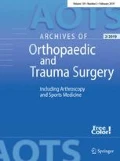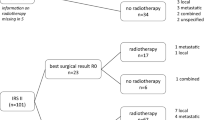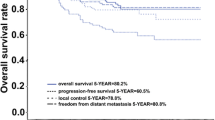Abstract
Background and purpose
We reviewed our experience of synovial sarcoma to identify factors predictive of local recurrence and overall survival, the impact of chemotherapy and outcomes after surgical excision alone.
Materials and methods
81 patients were treated between 1997 and 2014 of mean age 39 years (8–78). Tumours were in the extremity in 55 (67%). 9 patients presented with metastases and 10 with unresectable disease. Mean follow-up was 3.7 years (SD 3.8). Treatment groups were palliative, surgery only, surgery and radiotherapy, or surgery with chemotherapy (with or without radiotherapy).
Results
Local recurrence-free survival (LRFS) was 73% at 5 years, and 68% at 10 and 15 years. In multivariate analysis, positive surgical margins were an independent predictor of LRFS. Overall survival (OS) was 50% at 5 years for all patients, and 62% at 5 years for those treated with curative intent. Larger tumour size and non-extremity locations were predictors of poorer OS. Patients who had chemotherapy did not have significantly better OS or LRS than others.
Interpretation
These results show that where feasible, curative resection should not be delayed for chemotherapy. Treatment with surgery only can be associated with good outcomes in selected patients with smaller extremity tumours; although our series is small.



Similar content being viewed by others
References
Fletcher DMC (2013) Who classification of tumours of soft tissue and bone. World Health Organization, Geneva
Guillou L, Benhattar J, Bonichon F, Gallagher G, Terrier P, Stauffer E et al (2004) Histologic grade, but not SYT-SSX fusion type, is an important prognostic factor in patients with synovial sarcoma: a multicenter, retrospective analysis. J Clin Oncol 22(20):4040–4050
Guillou L, Coindre J, Gallagher G, Terrier P, Gebhard S, de Saint Aubain Somerhausen N et al (2001) Detection of the synovial sarcoma translocation t(X;18)(SYT;SSX) in paraffin-embedded tissues using reverse transcriptase–polymerase chain reaction: a reliable and powerful diagnostic tool for pathologists. A molecular analysis of 221 mesenchymal tumors fixed in different fixatives. Hum Pathol 32(1):105–112
Sultan I, Rodriguez-Galindo C, Saab R, Yasir S, Casanova M, Ferrari A (2009) Comparing children and adults with synovial sarcoma in the Surveillance, Epidemiology, and End Results program, 1983 to 2005: an analysis of 1268 patients. Cancer 115(15):3537–3547
Chotel F, Unnithan A, Chandrasekar CR, Parot R, Jeys L, Grimer RJ (2008) Variability in the presentation of synovial sarcoma in children: a plea for greater awareness. J Bone Jt Surg Br 90(8):1090–1096
Henderson SA, Davis R, Nixon JR (1991) Synovial sarcoma: a clinicopathological review. Int Orthop 15(3):251–255
Trassard M, Le Doussal V, Hacene K, Terrier P, Ranchere D, Guillou L et al (2001) Prognostic factors in localized primary synovial sarcoma: a multicenter study of 128 adult patients. J Clin Oncol 19(2):525–34
Eilber FC, Brennan MF, Eilber FR, Eckardt JJ, Grobmyer SR, Riedel E et al (2007) Chemotherapy is associated with improved survival in adult patients with primary extremity synovial sarcoma. Ann Surg 246(1):105–113
Ferrari A, Gronchi A, Casanova M, Meazza C, Gandola L, Collini P et al (2004) Synovial sarcoma: a retrospective analysis of 271 patients of all ages treated at a single institution. Cancer 101(3):627–634
Kampe CE, Rosen G, Eilber F, Eckardt J, Lowenbraun S, Foster J et al (1993) Synovial sarcoma. A study of intensive chemotherapy in 14 patients with localized disease. Cancer 72(7):2161–2169
Spurrell EL, Fisher C, Thomas JM, Judson IR (2005) Prognostic factors in advanced synovial sarcoma: an analysis of 104 patients treated at the Royal Marsden Hospital. Ann Oncol 16(3):437–444
Palmerini E, Staals EL, Alberghini M, Zanella L, Ferrari C, Benassi MS et al (2009) Synovial sarcoma: retrospective analysis of 250 patients treated at a single institution. Cancer 115(13):2988–2998
Yaser S, Salah S, Al-Shatti M, Abu-Sheikha A, Shehadeh A, Sultan I et al (2014) Prognostic factors that govern localized synovial sarcoma: a single institution retrospective study on 51 patients. Med Oncol 31(6):958
Italiano A, Penel N, Robin YM, Bui B, Le Cesne A, Piperno-Neumann S et al (2009) Neo/adjuvant chemotherapy does not improve outcome in resected primary synovial sarcoma: a study of the French Sarcoma Group. Ann Oncol 20(3):425–430
Woll PJ, Reichardt P, Le Cesne A, Bonvalot S, Azzarelli A, Hoekstra HJ et al (2012) Adjuvant chemotherapy with doxorubicin, ifosfamide, and lenograstim for resected soft-tissue sarcoma (EORTC 62931): a multicentre randomised controlled trial. Lancet Oncol 13(10):1045–1054
Brennan B, Stevens M, Kelsey A, Stiller CA (2010) Synovial sarcoma in childhood and adolescence: a retrospective series of 77 patients registered by the Children’s Cancer and Leukaemia Group between 1991 and 2006. Pediatr Blood Cancer 55(1):85–90
El-Naggar AK, Ayala AG, Abdul-Karim FW, McLemore D, Ballance WW, Garnsey L et al (1990) Synovial sarcoma: a DNA flow cytometric study. Cancer 65(10):2295–2300
Singer S, Baldini EH, Demetri GD, Fletcher JA, Corson JM (1996) Synovial sarcoma: prognostic significance of tumor size, margin of resection, and mitotic activity for survival. J Clin Oncol 14(4):1201–1208
Oda Y, Hashimoto H, Tsuneyoshi M, Takeshita S (1993) Survival in synovial sarcoma. A multivariate study of prognostic factors with special emphasis on the comparison between early death and long-term survival. Am J Surg Pathol 17(1):35–44
Lewis JJ, Antonescu CR, Leung DH, Blumberg D, Healey JH, Woodruff JM et al (2000) Synovial sarcoma: a multivariate analysis of prognostic factors in 112 patients with primary localized tumors of the extremity. J Clin Oncol 18(10):2087–2094
Okcu MF, Munsell M, Treuner J, Mattke A, Pappo A, Cain A et al (2003) Synovial sarcoma of childhood and adolescence: a multicenter, multivariate analysis of outcome. J Clin Oncol 21(8):1602–1611
Hajdu SI, Shiu MH, Brennan MF (1988) The role of the pathologist in the management of soft tissue sarcomas. World J Surg 12(3):326–331
Author information
Authors and Affiliations
Corresponding author
Ethics declarations
Conflict of interest
We hereby state that “no” financial or personal gains of any kind have been received by any of the authors in preparation of this manuscript. Dr. Munir Khan stating on behalf of all the authors of this manuscript.
Rights and permissions
About this article
Cite this article
Khan, M., Rankin, K.S., Todd, R. et al. Surgical excision and not chemotherapy is the most powerful modality in treating synovial sarcoma: the UK’s North East experience. Arch Orthop Trauma Surg 139, 443–449 (2019). https://doi.org/10.1007/s00402-018-3059-x
Received:
Published:
Issue Date:
DOI: https://doi.org/10.1007/s00402-018-3059-x




